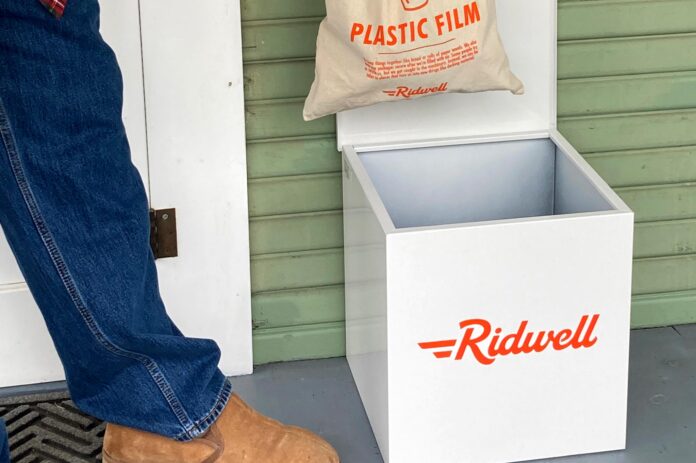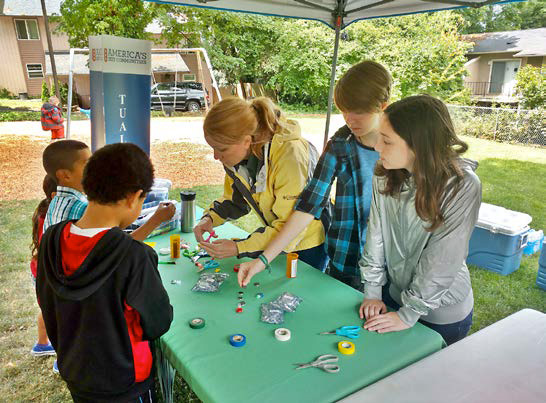
The city of Tualatin is exploring formalizing its relationship with Ridwell, a Seattle-based subscription service that’s already collecting hard-to-recycle items from households in the community.
Want to recycle clear plastic clamshells, household batteries, fluorescent bulbs or Styrofoam? None of these items are currently collected by franchised garbage and recycling companies.
According to a staff report, Ridwell is currently operating in Tualatin without official licensure or regulatory approval to do so.
Ridwell recently applied for a permit to operate a solid waste recycling facility in Portland and is waiting for a decision on that from DEQ and Metro. The company has approximately 20,000 customers already in the Portland area.
In a Nov. 12 letter to Caleb Weaver, vice president of public affairs, Tualatin City Manager Sherilyn Lombos wrote, “A franchise agreement appears to be the best path forward to doing business in Tualatin. We invite (Ridwell) to reach out to the City to explore options through the City’s franchise process.”
This is how it works. Ridwell supplies customers with a white metal box to place at or near their front door, for collection of select items. Five canvas bags–marked for light bulbs, household batteries, threads, plastic film, and a monthly featured item–are provided as well.
Reusables, accepted for the benefit of charities at a scheduled time, have included items like jeans, children’s books, electronics, holiday decorations, and winter coats.
The cost of this subscription is $12 to $16 per month, depending on the customer’s commitment. One year prepaid, for example, is $12 per month. Additionally, plastic PET clamshells are $1 per bag, florescent tubes are $4 each and polystyrene (Styrofoam) is $9 per bag.
Every two weeks an employee drives up in a van and collects the recyclables from the customer’s front porch. Those recyclable and reusable items are collected, sorted and distributed at the company’s warehouse in Portland.
At a Tualatin City Council work session on Jan. 24, Weaver gave a presentation. What follows are comments, questions and answers from that work session.
Councilor Valerie Pratt: I’m wondering if your company is looking at the cost of recycling materials and the transportation cost of recycling and carbon emissions, assuming your fleet isn’t electric?
Caleb Weaver: We’re running one vehicle through the neighborhood every two weeks. So our carbon footprint is much less than everyone in the neighborhood driving to a recycling event or location. Regarding the cost of materials, we don’t make money off of the items we recycle. Households subscribe—that’s how we make our money. It’s not reliant on materials.
Pratt: What about people who live in apartments or others who don’t have the extra cash for your service?
Weaver: Ridwell serves single-family homes as well as multifamily units. We have relationships and agreements to serve apartment complexes as well. For low-income residents, we have a scholarship fund available that we and others contribute to.
Pratt: We have an exclusive franchise agreement with garbage and recycling company. Wouldn’t allowing Ridwell to operate violate that franchise agreement?
Weaver: The garbage hauler that has that contract doesn’t compete with us. We’re not competing with recycling services and landfill haulers. We are in support of local policies that have oversight. Garbage haulers are not providing this service. We are complementing their services. We are accepting items that haulers themselves have said are difficult to recycle. Don’t need this.
Councilor Maria Reyes: This is a different model than waste management. We need a new way of thinking. This is a great service, which is good for our environment. Why aren’t we allowing that?
Weaver: It’s an optional service we want to provide. Yes, it’s a different approach and model.
Councilor Bridget Brooks: As a social worker, I’ve been impressed by the reusable items that have been donated (by Ridwell) to Community Warehouse we are working with here. This is a wonderful community service. Can you provide receipts for charitable contributions?
Weaver: Yes.
Brooks: How many employees do you have?
Weaver: We have about 50 employees in the Portland area. Most of them are drivers or work in our warehouse. We are paying people above minimum wage, and it is hard work, so we appreciate what they do for us.
Council President Nancy Grimes: I’m concerned about licensing and oversight. I would like to see a franchising agreement with Ridwell and our other partners. Are other councilors interested in that approach? We are short-handed without a city attorney. We need to think about a regulatory framework for this service.
Weaver: We are happy to work with you on regulations, whether it is a permit or dropbox franchise.
Reyes: This is part of our environmental goals. We have to look at the code. Because times have changed. I have been at home more than ever the past two years. I see how much trash is generated. What am I going to do with all this stuff? Sometimes we tend to rush things and never get back to them. But this issue I care about. I want to be sure we continue this discussion.
Mayor Frank Bubenik: What I am waiting for are Metro and DEQ’s decision. How are they going to rule? It’s possible they could deny their permit. Overall, I think this was a terrific introduction to Ridwell and we’ll need to discuss our options with staff. And that may need to wait until we have a new city attorney. We’ll circle back to have this discussion. And we’ll be back in touch.





















